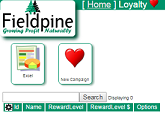What is a Customer?
A customer in the Point of Sale is the actual person or entity making the sale. It is who you are actually transacting with.
The POS also has accounts, which contain one or more customers.
So, when dealing with "Acme Co Ltd" (an account), you may actually sell to "Fred" (a customer) and "Mary" (another customer), even though they both are buying for "Acme Co Ltd". This seperation is required for complex environments, but is very easy to use in any retail environment.

Customer & Account Portals
Provide private information to your customers, receipts, statements, offers, orders...
Customer Specific Pricing

Loyalty
Reward your customers with special vouchers or free merchandise once they have earned sufficient points.

Prepay
Store cards that contain value. Used for Stored Value Cards, in house gift cards and similar
Online and Email Receipts
Receipts can be emailed, or provided online anonymously
Database Attributes and Fields
The following fields are available in the database for customers. This is subject to specific site setup. Site specific fields may also be available, which are not shown below. If the list below does not include a required attribute and it is common across an industry segment we may be able to add it
This table is only showing primary attributes stored in the database. Derived information such as number of sales, total revenue, last sale information, buying preferences and so forth are available via specific APIs. Many retailers extend this information to include
Related Information (aka relationships):
The following fields exist but have yet to be documented.
Technical Notes
This section provides a quick list of technical notes and summaries for IT professionals.Names
Capture of customer names has a few options due to the infinite variety of peoples names. Some sites prefer to capture the full name in a single field, others prefer to capture individual name parts into seperate database fields. There are advantages and disadvantages to both approaches.
- If you only capture the full name, this might be unwiedly or too formal in some circumstances
- If you capture parts of names (eg lastname, firstname) this might present problems for customers that have no concept of this division.
- Generally, the decision is based on how you want to use the customers name.
- Splitting and joining of names is not easy, possible, but non trivial, this of course depends on where you are located and your customer base.
- If possible, get the customer to complete their name entry. They will use the spacing, casing and breaks they feel acceptable for the details you are trying to capture.
The POS has to support both environments, so we expose multiple name fields, often containing redundant information
The following is a subset of the special cases you may need to deal with- Some people have only one name
- Spaces do not necessarily indicate a break between name parts.
- Married couples can have completely different names. And their children too.
- Portuguese names are often 5 segments long when fully specified.
- Modifiers such as "de", "von", "da", "vom" may have subtle changes depending on the original origin of the name. The exact casing of these parts can be culturally significant.
- A single letter can be a valid name. "R Smith" might be the fully specified name, "R" might not be an initial or abbreviation
Addresses
As with names, should addresses be captured as one block or seperate parts? The POS supports both models, but unless you have special handling requirements we suggest you use a single field mode for capture. This is more natural to enter and saves keystrokes.
Often, if you enter a single field address, the system will automatically try and decode to seperate lines for you
New Customer Creation
In the POS new customers can be created anywhere in your retail network. The system will take care of distribution to other lanes
You can load customers from external systems only and disable all POS create/update access to customer details.
If you are installing a Pos System in an environment where full access to customer lists should be restricted, such as an agency in a third party store, you should ensure that the Pos is configured to both limit and audit all customer searching.
Derived Customers
The POS system also has a concept of derived customers you will see on some reports. A derived customer is where the reporting system is able to use traces of information to tie random sales together in one purchasing group. This can be extremely useful for analytical reporting, however it can be misled.
Deriving customers can over time build a highly accurate picture of invidividuals. However, the engine deriving customers has been restricted to remove uniquely identifying information. Using the anonymous data for reporting is typically acceptable but going one step further may be too far.
Data Capture
You are freely able to capture and store almost any attribute about a customer (exception, full credit card numbers). These can be stored in global defined fields or site specific fields.
Many countries have regulations around customer data and we expect tighter controls in the future. In general, you should only capture and store data against a customer that you have a need to know. The rules are often less restrictive where data is being collected for anonymous purposes
